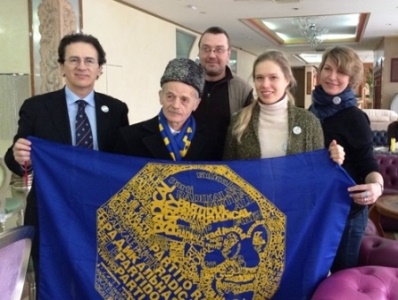On 25 February 2014, the Ukranian Parliament has voted to send fugitive President Viktor Yanukovich, former interior minister Vitaly Zakharchenko and former prosecutor-general Viktor Pshonka to the International Criminal Court for crimes against humanity allegedly committed between 30 November 2013 and 22 February 2014. The resolution was adopted with a vote of 324 MPs in favour, out of a total Parliament of 450 deputies, exceeding a two third majority. Ukraine signed the Rome Statute of the ICC on 20 January 2000 and became the first non-State Party to accede to the Agreement on Privileges and Immunities of the Court on 29 January 2007.
Ukraine has not yet ratified the Rome ICC Statute and in a July 2001 ruling, its Constitutional Court expressly required a constitutional amendment before ratification could take place. The Constitutional Court decision is not binding on the ICC, which applies its own admissibility criteria, but it is binding on Ukrainian authorities, particularly when it comes to arrests and transfers.
For Ukraine to give effective jurisdiction to the ICC over the time period voted by the Ukrainian Parliament today, it should amend the Constitution pursuant to Chapter XIII and in accordance with the Constitutional Court ruling of 2001. Then it can either ratify the Rome Statute and refer formally its own situation to the ICC pursuant to article 14, or alternatively lodge a formal declaration accepting ICC jurisdiction pursuant to article 12(3) requesting that the Prosecutor open an investigation, with retroactive application in accordance with article 11(2).
In either case, the Rada needs to follow-up its Resolution with a concrete decision to amend the Constitution and mandate the new Ukraine Government to take the necessary steps in The Hague to seize the ICC of the crimes alleged. Only then it will be possible for the ICC Prosecutor to proceed with the next steps in determining admissibility.
The Ukrainian Parliament has an opportunity to send a strong signal to the people of Ukraine that the principle of legality has meaning in a new Ukraine, by transforming today’s declaration into a legal and operational tool to support the rule of law and embed it within Ukraine’s judicial and political system. The Parliament should use this opportunity to make the necessary constitutional amendments and ratify the Rome Statute, since more than two-thirds of its members have today taken a vote in favour of the ICC. By doing so, the Rada can provide a new path of legality that will support a bright future for Ukraine more than the financial relief and the economic support offered by the international community.
Delegation of the NRPTT in Kiev
From 21 to 26 February 2014, a Delegation of the Nonviolent Radical Party, Transnational and Transparty and No Peace Without Justice is present in Kiev in order to meet with representatives of the Euromaidan movement and opposition leaders. In the framework of this visit, they met among others with Mustafa Dzhenylov, MP and leader of the Tartars in Crimea, former political dissident, Alexandra Novitchkova, volunteer of Euromaidan SOS, Maria Tomak, volunteer of Euromaidan SOS and the Center for Civil Liberties, Ostap Kridik, spokeperson of the Committee for Self-defence.
Coverage by Radio Radicale
– Antonio Stango (in Kiev), 25 February 2014
– Interview of Ostap Kridik by Laura Harth, Radio Radicale
– Kiev 2014: Heroes never die, Laura Harth, RadicalNonviolentNews #7
For further information, contact Alison Smith on asmith@npwj.org or +32-2-548 39 12 or Nicola Giovannini on ngiovannini@npwj.org or +32-2-548-3915.




